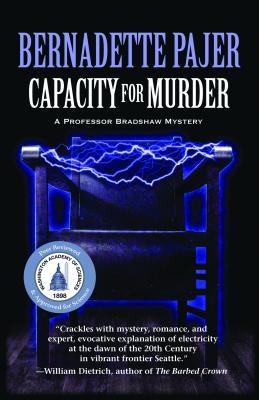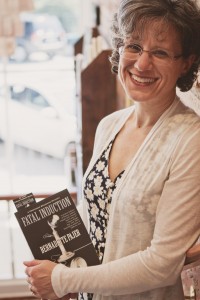On one of the last few days of an extraordinary Seattle summer I had the pleasure of interviewing Bernadette Pajer, author of the Professor Bradshaw series of mystery books. Book one was the book review for this month so this seems extra fun. Oh, and did I mention she lives in the Pacific Northwest as well. We do have many, many talented writers here.
Bernadette, thank you for agreeing to this interview.
My pleasure, and to be honest, I am happy to see the rain.
1. What, or who, was your inspiration for the Professor Bradshaw mysteries?
Well, I've answered this question in several ways over the past couple years, and they're all true! Such is the genesis of characters. Professor Benjamin Bradshaw came to me rather fully formed, plodding through life with a wounded heart and a brilliant, although practical, mind. Featuring him in a series allows me to explore the fascinating people and social forces that took the world from candlestick telephones and Stanley Steamer cars to astronauts and computers—in just six decades.
2. The technical descriptions of early electricity are wonderful. Electricity is something we take for granted, but it does have a long history before it came to power our laptops and iPods. How did you tackle the research and pick the time period?
While it's true the history of electrical exploration goes back hundreds of years, it was in the early 1900's, the time of Edison and Tesla and the Professor Bradshaw Mysteries, that the accumulated discoveries and inventions built to this sort of critical mass that allowed ideas to leap forward at a crazy pace and practical electrical inventions to begin to become part of the average person's life. Research is my favorite part of writing, and thanks to technology, fairly easy to get my hands on. While I do some research in person at the University of Washington Libraries and MOHAI (the Museum of History and Industry in Seattle), and I have some fabulous historical electrical engineering texts, most of the primary materials I use and peruse are online. Historical newspapers, scientific journals, magazines, books, photographs, maps. Nearly all I need is available online through the digital archive resources of libraries, schools, museums, and more.



3. How do you set about writing a Professor Bradshaw book? Do you map it out before writing or do you listen to the professor to find out where the story will take you? Describe your process.
Every book evolves differently, but my basic approach is to begin with the whodunit or howdunit. As I look for an electrical invention to feature, I also consider motives for murder, a possible victim, a villain. I also think about Professor Bradshaw's personal story, what personal conflicts will develop or be overcome and how I can tie those in with his investigation. I give some thought to other recurrent characters, Bradshaw's son, his friends Detective O'Brien and Henry Pratt, his housekeeper Mrs. Prouty. Then I begin to research both for science and history, and often I will get more ideas from what I learn as to how the story will develop. When I feel I know the skeleton of the story and the major scenes, I begin to write, often pausing to do more research. In the first draft, I figure out the story at the scene level with dialogue and major action and a bit of setting. In the second draft, I flesh out those scenes more, adding more detail and layers to the narrative and emotional reactions. In the third draft, I continue to add detail, refine the language, find more eloquent ways of describing things. In the fourth draft . . . well, you see how it goes. It's not really as tidy as I describe it. Some chapters get to the final draft stage months before others, but eventually it's all done, and that is a wonderful feeling!
4.You’re published through Poisoned Pen Press, an independent publisher specializing in mysteries, how has that experience been and did you need an agent to get read by them?
Poisoned Pen Press is a medium-sized award-winning traditional publisher so authors have the benefits of national distribution and reviews while also enjoying a comfortable, almost casual relationship with the publisher and editors and others that keep the Press running. I do have an agent who's awesome (Jill Grosjean) but PPP accepts unagented submissions and gives all authors equal consideration.
5. eBook vs Print?
I like both, actually. They fill different needs for me. I love that I can always have an ebook or an audio book on my smart phone to sneak in a bit of reading whenever I have a few spare minutes. I love that I can inexpensively buy or freely borrow books 24 hours a day, download them to my phone or Nook in seconds, and read immediately. I also love the feel of a print book in my hand, the heft of it, the sound of the turning pages, the smell of books both new and old. Especially old. When both are available choices for me, I'll always choose the print book to curl up with.
6. Pen & Paper or a computer?
Oh, I'm a computer writer. I'm not one of those writers for whom lyrical prose drips from my pen. I build a story one layer at a time, and a computer serves my process well. See answer #3!
7. What do you think is the most important thing a writer can do, aside from write well, to increase their odds of a successful career?
Goodness, I wish I knew! You're right that the most important thing is to tell our stories as best we can and to just keep writing. Beyond that, success is an elusive thing, and not always bestowed fairly. Perhaps the most important thing beside writing well is to keep writing. Keep learning, keep challenging yourself, keep completing books and sending them out into the world. Most writers aren't overnight successes. Some of the biggest authors were published for years with very modest sales before a book suddenly took off and launched them into bestsellerdom. Or over the years, a readership built up to bestselling levels. I'm kinda hoping that happens to me and the Professor.
8. What secret talent do you have, which everyone reading this blog will keep secret? Or, what’s the craziest thing you’ve done in the name of research?
Ha! I have no secret talents, but what a fun question. Makes me wish I had something to share. And I'm afraid I'll disappoint you with my crazy research answer. I built a homemade Leyden jar, but that's not crazy, and only takes a glass and a bit of foil. My go-to science guy, electrical engineer Bill Beaty, once burned sulfur in his basement for me. That's not crazy either, just smelly.
Thank you so much for taking the time to answer my questions, and I look forward to more Professor Bradshaw Mysteries.
Thank you for the opportunity to introduce my series to your readers, Lynn.
A book trailer can be found here: http://bernadettepajer.com/trailer/

No comments:
Post a Comment